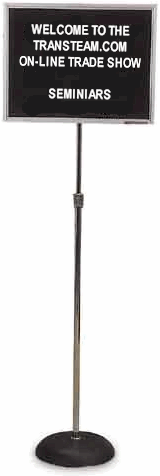On-line Trade Show - Seminars
Life on the Net
by Art Little
This article appeared in the May 2000 issue of Transmission Digest.
"We may be lost, but we're making good time." That's what a friend of mine named Mark Sherrod said to me early one morning as he was driving 90 miles an hour to a secret fishing hole we couldn't find. He had gotten directions the day before, but I guess it was truly a secret fishing hole, because we never did find it. I think that is how a lot of us feel when we are looking for information on the Internet.
Searching the net is much like the road trips that Mark and I used to take back in high school. We always made good time but, we learned the hard way that, if we planned our trips, we made better time and actually found our destination more often than not.
I look at searching the Internet as a road trip every time I look something up. Having taken many road trips on the information highway and running into a lot of dead end streets, I know first hand the frustration many of us new to the Internet are suffering. There is tremendous amount of information on the Internet and you need to choose the right search strategies to have successful road trip.
Try to look at it this way. Your computer and Internet connection is your vehicle for the road trip. The search engines that find the information you are looking for are built and sitting on the shelf ready to install. Each engine runs differently and searches for different information. There are different types of searches that are best searched by a specific engine. So, if you know what engine to install before you start a certain type search, you are miles ahead.
In an effort to keep your vehicle between the ditches and save you some time, I am listing the common search strategies I use nowadays when I take a road trip on the information highway and what engines I install before I hit the road. Here is my list of search types and my choice of engines.
- A broad overview of a subject.
- Engine: Looksmart is a topical directory of the Web, with more than 24,000 categories to choose from.
- A subject using a short phrase of two or three words.
- Engine: Infoseek recognizes phrases, and won't ignore the most common words that other search engines discard.
- The answer to a plain English question.
- Engine: Ask Jeeves has the answers to more than 7 million common questions, and understands plain English queries.
- A topic using rare or uncommon words.
- Engine: Because AltaVista is the largest Web index, it will find the most documents about rare or uncommon subjects.
- The most popular Web sites on a subject.
- Engine: Search using HotBot, then click on the "Get the Top 10 Most Visited Sites For [Your Query] link, at the top of your results list.
- Web pages in a specific language.
- Engines: Both AltaVista and HotBot let you restrict your search to specific languages.
- Web pages that were published on a specific date.
- Engines: AltaVista's Advanced Search and HotBot's Super Search find documents created within a specific date range.
- The most comprehensive results for a topic.
- Engines: Dogpile and Metacrawler are meta-search engines, meaning they simultaneously scan the indexes of multiple search engines and present you with all of the results.
- The ability to search within the results of a search.
- Engine: Infoseek lets you refine your search using only the results from a previous query.
- Searches for cities, companies, or sports teams
- Engine: Excite prioritizes results for these types of searches, presenting you with city information including maps and weather, company news and information, and sports schedules, stats, and scores.
Well friends, be careful on the highway till we meet again. And don't forget, if you get lost, put in another engine, but above all, keep the petal to the metal and make good time.


